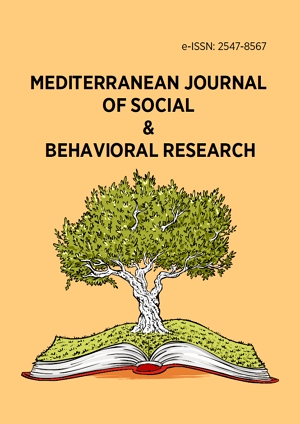Research Article
University of Port Harcourt Student-Teachers’ Self-Determination and Hindrances Towards Learning Online During COVID-19
More Detail
1 Department of Curriculum Studies and Educational Technology, Faculty of Education, University of Port Harcourt, NIGERIA* Corresponding Author
Mediterranean Journal of Social & Behavioral Research, 6(1), February 2022, 3-11, https://doi.org/10.30935/mjosbr/11466
Submitted: 18 October 2021, Published: 03 January 2022
OPEN ACCESS 1457 Views 891 Downloads
ABSTRACT
This analytical survey focused on investigating the level of student-teachers’ self-determination towards learning online during COVID-19 at the University of Port Harcourt and the hindrances they experienced. Two objectives and six hypotheses guided the study. The population was two thousand, seven hundred and sixty-seven (2,767) student-teachers in the Faculty of Education with a sample size of six hundred and twelve (612) drawn randomly from the population. The study gathered data using the researchers’ developed questionnaire with a 0.76 alpha reliability coefficient. Data analyses were through mean, standard deviation, t-test, and Welch test. The results disclosed that the University of Port Harcourt student-teachers’ self-determination level to learning online during COVID-19 was high; this varies significantly based on study years, departments and gender. Lecturers’ inability to develop online courses and distractions during learning online, among others, were the hindrances that affected the student-teachers’ self-determination towards online learning during the COVID-19 pandemic. These hindrances vary significantly based on the student-teachers’ study years and departments but were insignificant on a gender basis. Among the recommendations were that the University of Port Harcourt should train its lecturers to develop online courses and deliver them through Learning Management Systems dedicated solely for online learning purposes.
CITATION (APA)
Augustine, S. E., & Ezeoguine, E. P. (2022). University of Port Harcourt Student-Teachers’ Self-Determination and Hindrances Towards Learning Online During COVID-19. Mediterranean Journal of Social & Behavioral Research, 6(1), 3-11. https://doi.org/10.30935/mjosbr/11466
REFERENCES
- Agbejule, A., Ndzibah, E., & Lotchi, K. (2021). Motivation and barriers of online learners in the era of COVID-19. A perspective of study in Vaasa Universities. https://www.theseus.fi/bitstream/handle/10024/429234/978-952-5784-46-6_%282%29.pdf?sequence=1&isAllowed=y
- Alli, Y. (2020). Minister to varsities: Restart session through virtual teaching. Available at: https://thenationonlineng.net/minister-to-varsities-restart-session-through-virtual-teaching/
- Balakrishnan, B., & Long, C. Y. (2020). An effective self-directed personalized learning environment for engineering students during the COVID-19 pandemic. Advances in Engineering Education, 8(4), 1-8.
- Bates, T. (2016). Online learning for beginners: What is online learning? https://www.tonybates.ca/2016/07/15/online-learning-for-beginners-1-what-is-online-learning/
- Batmang, B., Sultan, M., Azis, A., & Gunawan, F. (2021). Perceptions of pre-service teachers on online learning during the COVID-19 pandemic. International Journal of Education in Mathematics, Science, and Technology, 9(3), 449-461. https://doi.org/10.46328/ijemst.1595
- College SA. (2017). Online learning. https://www.colleges.co.za/online-learning
- Gustiani, S. (2020). Students’ motivation in online learning during COVID-19 pandemic era: A case study. Holistics Journal, 12(2), 23-40.
- Mbunge, E., Fashoto, S. G., & Olaomi, J. (2021). COVID-19 and online learning: Factors influencing students’ academic performance in first-year computer programming courses in higher education. SSRN Electronic Journal. https://doi.org/10.2139/ssrn.3757988
- National Deaf Center on Postsecondary Outcomes (NDC). (2020). Decide, act, believe: How to assess and empower self-determination in deaf youth. Available at: https://www.nationaldeafcenter.org/news/decide-act-believe-how-assess-and-empower-self-determination-deaf-youth
- Nissman, C. (2020). 4 self-determination skills to build during remote instruction. Available at: https://districtadministration.com/4-self-determination-skills-to-build-during-remote-instruction/
- NOVA Southeastern University. (2020). Massive online open courses (MOOC): History of MOOC. https://nsufl.libguides.com/c.php?g=112312&p=725994
- Onyema, E. M., Nwafor, C. E., Obafemi, F. A., Sen, S., Atonye, F. G., Sharma, A., & Alsayed, A. O. (2020). Impact of Coronavirus pandemic on education. Journal of Education and Practice, 11(13), 108-121. https://doi.org/10.7176/JEP/11-13-12
- Sari, T., & Nayir, F. (2020). Challenges in distance education during the (COVID-19) pandemic period. Qualitative Research in Education, 9(3), 328-360. https://doi.org/10.17583/qre.2020.5872
- Sivrikova, N., Chernikova, E., Kharlanova, E., Ptashko, T., Perebejnos, A., & Ryabykh, I. (2021). Study of student’s self-isolation adaptation strategies during the COVID-19 pandemic. BIO Web of Conferences, 29, 01001. https://doi.org/10.1051/bioconf/20212901001
- UNESCO. (2020). The futures of education after COVID-19 regional dialogue synthesis report. https://en.unesco.org/sites/default/files/synthesis_report_future_of_education_webnair_1.pdf
- Vialu, C. (2018). Enhancing self-determination: Strategies to incorporate in our interventions. https://www.seekfreaks.com/index.php/2018/09/27/enhancing-self-determination-strategies-to-incorporate-in-our-interventions/

 The articles published in this journal are licensed under the CC-BY Creative Commons Attribution International License.
The articles published in this journal are licensed under the CC-BY Creative Commons Attribution International License.